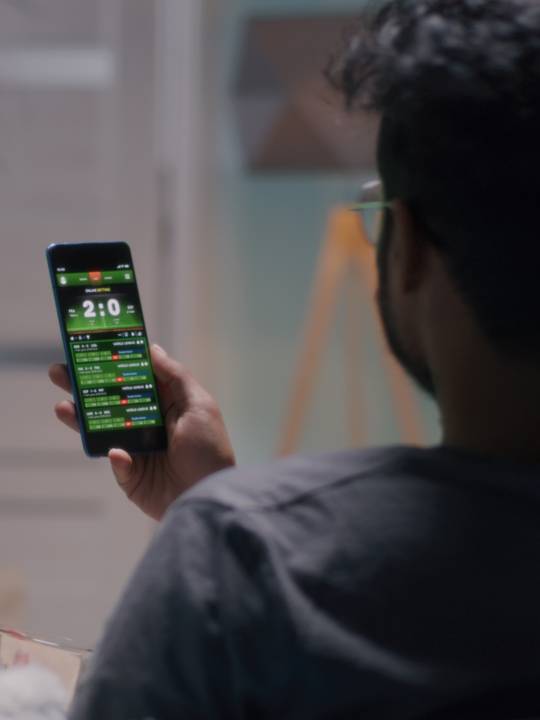Stick or Twist: Exploring identity routes for betting brands in 2024

Since becoming legal on the high street in 1961, betting shops have long been a place for punters and fans to gather, catch their favourite sports and try their chances at a win.
However, as the sporting world began to change and develop, consumer needs soon transformed too, with demand for online betting experiences growing day by day. Bookmakers had to digitise their offerings to meet demand for online engagement, or risk closing their doors.
The betting industry has grown exponentially since technology brought this immediacy and convenience to betting. Bettors crave interactive and real-time betting experiences, much like the social experiences high street bookies brought in their hay day.
As the government continues to crack down on regulations surrounding advertising, responsible betting and safeguarding consumers, some gambling brands have moved even further towards creating interactive online experiences to build more meaningful connections with consumers. But is this the right approach for everyone?
Betting brands have a choice. Do they stick with what they have, and double down on their traditional bookies identity? Or do they twist, and embrace the content-led digital movement, wherever it may take them?
What do consumers want from the betting experience?
No bettor plays the same. The games we enjoy and the lifestyles we lead mean how we bet is different for everyone. Consumers play on different products, for different experiences, in person and online – often at the same time.
The behavioural shift to online play means consumers are no longer restricted to opening hours or local events. Bettors can play 24 hours a day, 7 days a week on events happening around the globe at any moment.
A study from Deloitte showed that 77% of sports fans are consuming additional content while watching a sporting event – online and in person – including betting, looking up live statistics, and social media.
The highly personalised nature of modern betting means brands are always looking for innovative ways to provide consumers with the content they want, when they want it, where they want it, and how they prefer to consume it.
So, how are betting brands battling for customer acquisition and retention in what continues to be an extremely competitive playing field? How are brands looking to steal market share from one another? By shaping their identities and creating an interactive betting experience that matches consumer entertainment preferences.
The changing faces of the betting industry
Ladbrokes is one of the largest betting brands in the UK and a heritage high street bookmaker. The legacy gambling company has recently expanded its offering to engage consumers in another vector. Ladbrokes LIVE is a place where sports fans and Ladbrokes customers can access live events, sought-after tickets and exclusive content.
While there’s no betting directly involved in Ladbrokes’ new foray into entertainment, the venture seeks to further immerse sports fans into Ladbrokes’ ‘World of Play’. By firmly establishing themselves in the entertainment space, Ladbrokes can continue to provide value and firmly imprint the brand in the minds of bettors and sports fans.
Paddy Power has also stepped into another arena of entertainment. The betting company has long been known for their engaging social media content and tongue-in-cheek personality. The brand has now entered the scripted comedy space with its comedy series The Mascot and The Var Room on streaming services.
What are the benefits of gambling companies positioning themselves in the entertainment industry? The likes of Paddy Power and Ladbrokes can fully immerse consumers in their brand from all platforms – online and physical.
Providing consumers with unique experiences and valuable content that reinforces their brand, in all its facets, in the consumer’s mind helps to make them the go-to brand for all their sports, entertainment and betting needs.
What if everyone is doing entertainment?
With the relationship between betting and entertainment continuing to grow, the lines between what makes a betting company and what makes an entertainment provider are becoming increasingly blurred.
With a new social, interactive component to the industry, a lot of customers are now seeking value in ways beyond the traditionally transactional form of betting and gaming. So, can a betting company be just that? A place for sports fans to engage with their favourite teams, build connections with other fans, and place wagers based on their strategic knowledge of the game?
Make informed, insight-led decisions
Simply assuming that all audiences expect to see swathes of additional content and online entertainment would be short-sighted. Brands need to build a detailed picture of what their different audiences and demographics really value and expect from their favourite betting brand.
Whilst a content-led, entertainment-first approach to betting may favour certain betting brands, others may benefit from their established long-standing reputation and lean into their high street identity.
Ready to fine-tune your approach for 2024? Get in touch with Mike Cooper to discuss more – m.cooper@trinitymcqueen.com

Nudging modern attention: How streaming platforms can make remembering easier

A new appetite: How FMCG brands can innovate for the GLP-1 consumer

Tapping into “cosy season” with simple seasonal wins for retailers.


 Back to articles
Back to articles